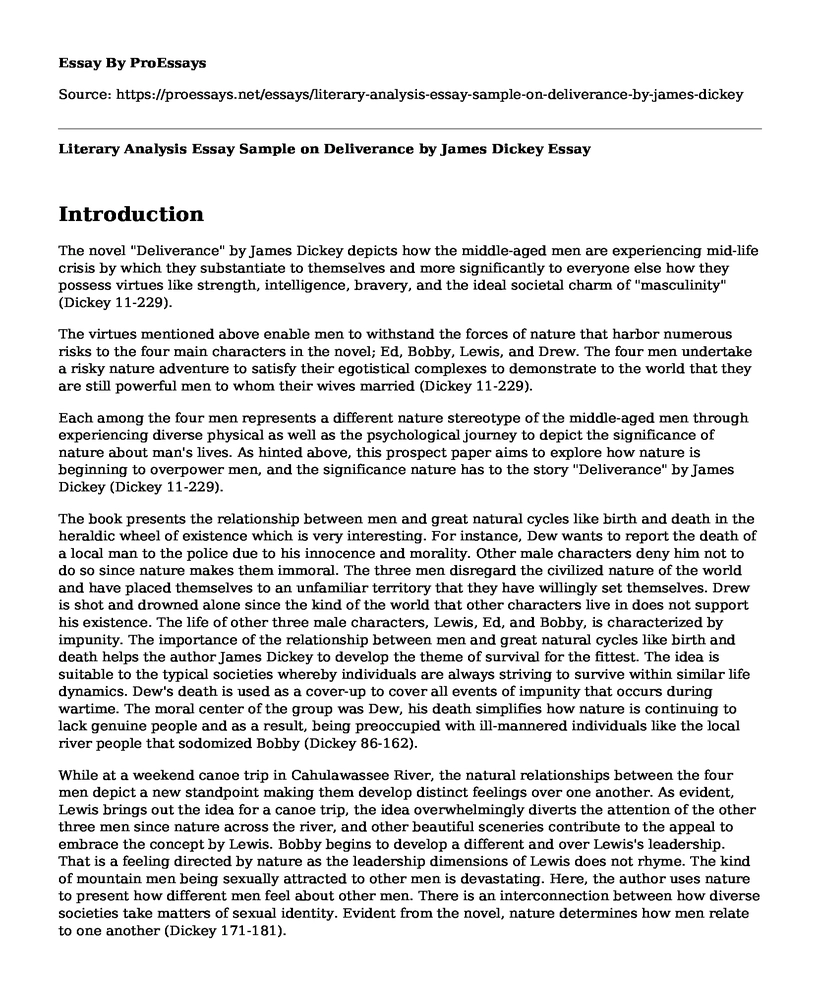Introduction
The novel "Deliverance" by James Dickey depicts how the middle-aged men are experiencing mid-life crisis by which they substantiate to themselves and more significantly to everyone else how they possess virtues like strength, intelligence, bravery, and the ideal societal charm of "masculinity" (Dickey 11-229).
The virtues mentioned above enable men to withstand the forces of nature that harbor numerous risks to the four main characters in the novel; Ed, Bobby, Lewis, and Drew. The four men undertake a risky nature adventure to satisfy their egotistical complexes to demonstrate to the world that they are still powerful men to whom their wives married (Dickey 11-229).
Each among the four men represents a different nature stereotype of the middle-aged men through experiencing diverse physical as well as the psychological journey to depict the significance of nature about man's lives. As hinted above, this prospect paper aims to explore how nature is beginning to overpower men, and the significance nature has to the story "Deliverance" by James Dickey (Dickey 11-229).
The book presents the relationship between men and great natural cycles like birth and death in the heraldic wheel of existence which is very interesting. For instance, Dew wants to report the death of a local man to the police due to his innocence and morality. Other male characters deny him not to do so since nature makes them immoral. The three men disregard the civilized nature of the world and have placed themselves to an unfamiliar territory that they have willingly set themselves. Drew is shot and drowned alone since the kind of the world that other characters live in does not support his existence. The life of other three male characters, Lewis, Ed, and Bobby, is characterized by impunity. The importance of the relationship between men and great natural cycles like birth and death helps the author James Dickey to develop the theme of survival for the fittest. The idea is suitable to the typical societies whereby individuals are always striving to survive within similar life dynamics. Dew's death is used as a cover-up to cover all events of impunity that occurs during wartime. The moral center of the group was Dew, his death simplifies how nature is continuing to lack genuine people and as a result, being preoccupied with ill-mannered individuals like the local river people that sodomized Bobby (Dickey 86-162).
While at a weekend canoe trip in Cahulawassee River, the natural relationships between the four men depict a new standpoint making them develop distinct feelings over one another. As evident, Lewis brings out the idea for a canoe trip, the idea overwhelmingly diverts the attention of the other three men since nature across the river, and other beautiful sceneries contribute to the appeal to embrace the concept by Lewis. Bobby begins to develop a different and over Lewis's leadership. That is a feeling directed by nature as the leadership dimensions of Lewis does not rhyme. The kind of mountain men being sexually attracted to other men is devastating. Here, the author uses nature to present how different men feel about other men. There is an interconnection between how diverse societies take matters of sexual identity. Evident from the novel, nature determines how men relate to one another (Dickey 171-181).
Dickey uses the lens of nature against men to illustrate how men are being overwhelmed by life. For example, when an owl lands on one man's tent to tear it open represents how nature can unveil the secrets of people who have robbed the society by promoting bad norms. The example above develops the plot by enhancing the parallelism of supporting the good and limiting doing wrong (Dickey 224).
Nature is used to depict the superiority that exists between men and natural calamities like strong water waves and accidents like death. Despite the masculinity of Lewis, he could not control the boat from drowning since natural forces were driving the ship. The drowning of the boat illustrates how men are inferior when matters of nature are under control. Moreover, when Bobby and Ed are trying to identify the corps, Ed decides to throw all the evidence concerning the encounter into the river (Dickey 109-117).
Conclusion
Here, nature is depicted as a powerful phenomenon that can hide evidence from man. All the above are evidence that the lens of nature against men stands nature at a ground that defeats the man. As evident, Bobby survives the sodomy situation but cannot recover what he lost during the rape, more so, despite the masculine nature of Lewis, he is reduced by drowning in the river. Dickey tries to illustrate how civilization is getting a man to the next level in life, despite that fact, man is still vulnerable in the face of nature. The novel is suitable as it applies to the contemporary world, where men are feeling to be more sophisticated individuals of the earth as it tries to balance their ability that lowers human ego (Dickey 171-178).
Work Cited
Dickey, James. Deliverance. Southern Illinois University Press, 1982.
Cite this page
Literary Analysis Essay Sample on Deliverance by James Dickey . (2022, Oct 16). Retrieved from https://proessays.net/essays/literary-analysis-essay-sample-on-deliverance-by-james-dickey
If you are the original author of this essay and no longer wish to have it published on the ProEssays website, please click below to request its removal:
- Diagnosing Abigail Williams in Crucible by Arthur Miller
- Comparison of the Novels Metamorphosis and Trials Essay
- The Use of Symbolism in Fahrenheit 451 Essay
- Drama Soundtrack in Fences Play
- Essay Example on Elizabeth Bishop: A Pioneer of American Modernism and Poetry
- Essay Example on Huck's Ordinary Life: Fear, Fight & Flight
- Paper Example on Fish Cheeks: Amy Tan's Crushing Fear of Rejection







